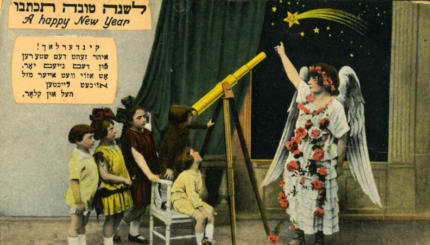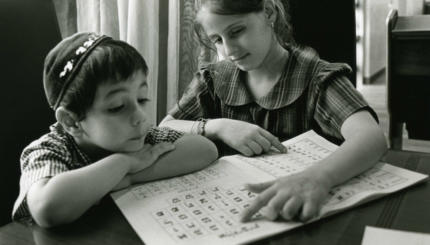While often called Ladino, the language of the Sephardic Jews who settled in the lands of the Ottoman Empire after their expulsion from Spain in 1492 is also known as Judeo-Spanish.
But neither term captures the multiple cultural influences that shaped the language for more than five centuries of life in the eastern Mediterranean, resulting in a marvelous blend of Spanish, Portuguese, Hebrew, Turkish, Arabic, Greek, Italian and French. Like Yiddish, Ladino was traditionally written in Hebrew characters and known as Djudezmo and Djudyo, words that mean “Jewish.” Below are a few popular Ladino expressions, with a pronunciation guide at the top.
Ladino Pronunciation Guide
j as in French “bonjour”
h as in English “hot”
dj as in English “joy”
1. Ijo de ken sos tu?
?איז’ו די קין סוס טו
Pronunciation: EE-jo de ken sos tu
Meaning: You are the child of whom?
How to use it: You meet someone, realize you might know people in common, and begin playing Sephardic Jewish geography with the question: “Ijo de ken sos tu?”
With your help, My Jewish Learning can provide endless opportunities for learning, connection and discovery.
2. Haberes buenos!
!חאביריס בואינוס
Pronunciation: ha-BEAR-es BWE-nos
Meaning: Good news!
How to use it: This can be used either to announce good news or as a way to ward off bad news.
Sample uses: You aced your exam and tell you parents: “Haberes buenos! I got an A!”
You find out Nona (grandma) broke her hip and, to ward off the bad news, reply, “Haberes buenos!”
3. Dezmazalado de mi!
!דיזמאזאלאדו די מי
Pronunciation: dez-ma-zal-A-do de MEE
Meaning: Pity me! I’m out of luck.
Sample use: You haven’t texted me in weeks! Dezmazalado de mi!
4. Djente de piron
ג’ינטי די פירון
Pronunciation: DJEN-te de pee-ROAN
Meaning: The one percent (i. e. rich folks)
Literal translation: “People of the fork”: owning a fork (and not just a spoon) was once a sign of high-class status.
5. Kome kon gana!
!קומי קון גאנה
Pronunciation: KO-may kon GA-na
Meaning: Bon appetit!
Literal translation: “Eat with desire.”
6. Engleneate!
!אינגליניאטי
Pronunciation: en-glen-AY-a-te
Meaning: Have fun!
Literal translation: Entertain yourself!
7. Hadras i baranas
חאדראס אי באראנאס
Pronunciation: HAD-ras ee bar-an-AS
Meaning: An outrageously big fuss. Being pretentious and really noisy at the same time.
How to use it: When someone is really making a scene: “Look at all that hadras i baranas!”
8. Bavajadas de benadam
באב’אז’אדאס די בן אדם
Pronunciation: ba-va-JAD-as de ben a-DAM
Meaning: Human foibles
Literal translation: Stupidities of mankind
Sample sentence: Water cooler chatter reveals the bavajadas de benadam.
9. Bivas, kreskas, engrandeskas, komo un peshiko en aguas freskas! Amen!
ביב’אס קריסקאס אינגראנדיסקאס קומו און פישיקו אין אגואס פ’ריסקאס אמן
Pronunciation: BEE-vas, KRES-kas, en-gran-DES-kas, KO-mo un pesh-EE-ko en AG-uas FRES-kas! a-MEN!
Meaning: An elaborate “bless you” after a sneeze (or multiple sneezes)
Literal translation: Live; thrive; grow; like a little fish in fresh water! Amen!
10. Kaminos de leche i miel!
קאמינוס די ליג’י אי מייל
Pronunciation: Ka-MEE-nos de LE-che ee MEE-el
Meaning: Bon voyage!
Literal meaning: May you follow paths of milk and honey
11. Sano i rezio!
סאנו אי ריזייו
Pronunciation: SA-no ee REZ-yo
Meaning: Farewell!
Literal meaning: May you be healthy and strong



